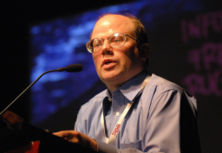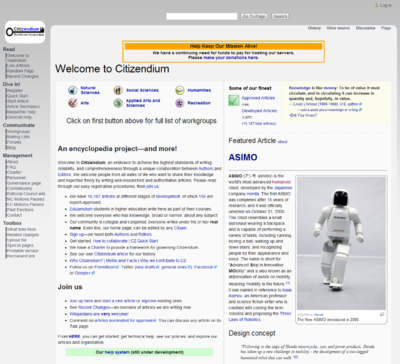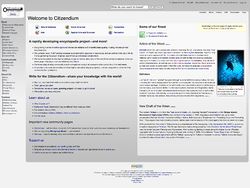Citizendium
The Citizendium (sit-ih-ZEN-dee-um, "a citizens' compendium of everything") is a wiki-based encyclopedia project founded by Larry Sanger, who also co-founded Wikipedia. The project aims to improve on the Wikipedia model by providing "reliable" and high-quality content,[1] and differs from Wikipedia in its real names policy (requiring all contributors to use their verified real names) and by providing what it calls "gentle expert oversight" of contributors ("Authors") by approved subject specialists or "Editors".
It was first envisioned as a complete "fork" of the English Wikipedia, but the project abandoned that idea prior its public launch to emphasize its own original articles. A main feature of the project is its "approved articles", which have each undergone a form of peer review by qualified topic-experts and are then closed to further editing. Citizendium was introduced as a "beta" (in development) project on March 25, 2007. After project members voted for a new charter in September 2010, the "beta" tag was dropped in 2011. The project currently has 16,427 articles in varying stages of development, of which 0 are approved.[2]
Structure
The Citizendium is run according to the articles of its Charter, which establishes various executive, managerial, disciplinary and technical roles. The Editorial Council (seven members, including four specialist Editors) is responsible for shaping the content of articles, while the Management Council (five members) deals with funding, appointments, and other administrative matters. The "Constabulary" of site moderators monitors behavior and maintains order in discussions, as well as approving new user accounts. In addition, there is a Managing Editor - to represent the project and make interim decisions - and an Ombudsman to mediate disputes (respectively Daniel Mietchen and Gareth Leng since October 2010). All these positions except those in the Constabulary are directly elected by project members in good standing (i.e. not blocked). 'Constables' are appointed by the Chief Constable (D. Matt Innis since October 2010), who is in turn appointed by the Management Council. There is a separation of powers in effect, under which one person may not serve in more than one of these offices at the same time. This does not apply to the Citizendium's technical staff, who are appointed to maintain the software and servers of the wiki, its forums and mailing lists.
Origin of Citizendium

[Larry Sanger]], co-founder of Wikipedia, former editor-in-chief of Nupedia, and consultant to other web-encyclopedia projects such as the Encyclopedia of Earth, announced the concept for Citizendium on September 15, 2006 at Berlin's Wizards of OS 4 conference. The project moved on to a pilot phase in October, and formally launched on March 25, 2007.
Like Wikipedia, Citizendium is a project to prepare an encyclopedia through the collaborative writing approach known as wiki. The first recognized wiki was created by Ward Cunningham, who began development of WikiWikiWeb in 1994.[3]
Fundamental principles
Citizendium was founded on the following organizational principles that, for the most part, distinguish it from Wikipedia. These principles are maintained by the Charter, which superseded the original 'Statement of Fundamental Policies' in September 2010.
Open collaboration
Citizendium is similar to Wikipedia in that it is an open wiki: the public is invited to participate and edit most pages.
Expert contribution
Unlike Wikipedia, Citizendium emphasizes the involvement of experts. While articles may be developed and revised by all Citizendium participants, the project places certain decisions in the hands of subject experts. (See article approval, below.)
Founding Editor-in-Chief Larry Sanger promoted the shift to expertise, saying: "people who know a great deal about a subject, who are recognized by various societal mechanisms for that knowledge, can add a great of value to Web 2.0 projects, if they are given special roles that recognize their expertise."[4] Using a metaphor from Eric S. Raymond's story about The Cathedral and the Bazaar, Sanger suggested that we "Think of editors as the village elders wandering the bazaar and occasionally dispensing advice and reining in the wayward. Their presence is merely a moderating, civilizing influence. They don't stop the bazaar from being a bazaar."[5]
Article approval
Citizendium requires that its finished articles be approved by experts familiar with the subject matter. Prior to approval, articles may be readily developed by any Citizendium participant. Upon approval, articles become the default article served to readers. Approved articles are not directly edited; instead, contributors are able to improve a draft version of the article, which may ultimately replace the Approved version.
Real names
Citizendium requires that participants use their real names, which project staff seek to verify before an applicant's account can be created. Applicants have to provide some evidence that they are who they say they are by submitting a biography of their background and interests along with something that confirms their identity, such as a non-free email address, ID scan, or testimonies from existing members. Minors are asked to provide less personal information, while applicants seeking to become Editors are required to provide more extensive evidence of their qualifications or experience. Sanger has stated that real names, in contrast to the pseudonyms common on Wikipedia, add to the credibility and accuracy of Citizendium articles.
Project goals
Neutrality
Citizendium adopted a Neutrality Policy[6] that was based on an early version of Wikipedia's neutrality policy (circa December 2001), which had been drafted by Sanger. The Citizendium policy was subsequently subjected to the Charter:
- Article 4: The Citizendium community shall recognize the special role that experts play in defining content standards in their relevant fields and in guiding content development towards reliability and quality.
- Article 18: The Citizendium shall welcome contributions in all fields of knowledge.
- Article 19: All articles shall treat their subjects comprehensively, neutrally, and objectively to the greatest degree possible in a well-written narrative, complementing text with other suitable material and media.
- Article 23: The Citizendium shall remain free of advocacy, advertisement and sensationalism.
- Article 39: An Ombudsman is available to mediate any dispute. Agreements worked out through mediation shall be binding but may be appealed.
Responsibility
Responsibility covers a broad scope within this project. Not only do members have responsibilities to the project and its contributors, but they also are responsible for the content they produce. The project has created policy that determines it will maximize attribution, either to an author or a source.
Additionally, the Citizendium guidelines propose that editors and authors alike have a responsibility to the public at large. It is the duty of all contributors at CZ to ensure that information on an article can be attributed to fact, and does not contain any questionable or unauthorized/copyrighted material, unless that required permission has been specifically granted for our use.
There is also a great importance of projecting reliable information; if Citizendium articles are not accurate then how can the project be credible? The goal is to create a "better free encyclopedia", and its users and content should aim to fulfill that.
Should there be any incident of irresponsibility or abject behavior or content, CZ has processes and policies in place that are able to deal with these in the most professional manner available, and those should be exercised first to prevent user conflict and infighting.
Governance
The Citizendium Charter provides rules for the governance of the project within its community. Examples (as of February 2012) include:
- Article 2: Citizenship shall be open to anyone who fulfills the basic conditions for participation as defined by the Management Council—including registering according to the real names policy—and agrees to abide by this Charter.
- Article 4: The Citizendium community shall recognize the special role that experts play in defining content standards in their relevant fields and in guiding content development towards reliability and quality.
- Article 5: Citizens shall act responsibly and in a civil manner: derogatory or offensive language or behavior will not be tolerated...
- Article 11: Citizens should expect Officers and Editors to be fair and impartial. Biased Officers and Editors shall recuse themselves from their official positions in any dispute resolution process.
- Article 14: Editors are Citizens whose expertise in some field of knowledge is recognized and formally acknowledged by the community. Official recognition of expertise — obtained through education or experience — and its scope shall be based on guidelines established by the Editorial Council.
The combination of these guidelines result in a project that while still existing as an "open system", must have attribution, accuracy, and the unbridled freedom for subject matter experts to be a part of the project.
Reception
On November 1st, 2007, Citizendium officially turned one-year old. To celebrate its birthday, Sanger produced a press release that presented a narrative snapshot of the current state of the project, in terms of its progress and to debunk some myths about its status. Also, a Slashdot post was made to mark the occasion.
Among web sites with the highest traffic, as of April 2012 Citizendium was ranked around 58,000 by Ranking.com, a drop since mid-May 2011 from an earlier level of about 10,000-12,000. According to Alexa, Citizendium's main audience demographic is split between 18-24 year-old and 55+ year-old males with graduate school educations.
Criticism
Objections to the Citizendium have been raised by journalists, bloggers and members of other wikis, particularly some Wikipedians. One early criticism focused on the wiki's guidance role for experts: the Citizendium cannot succeed because there is no such thing as an expert outside those institutions that specifically certify an individual as an expert; who is an "expert" depends on context.[7]
A common complaint is that the fledgeling Citizendium is too small to compete with bigger websites;[8] The strength of this argument would be diluted as the Citizendium gathered a larger contributor base over time and produced more articles.
More recently, criticisms of the Citizendium have often consisted of claims about poor decisions by the management of the site. The RationalWiki website provides an unmoderated, anonymous forum for such criticisms to be aired.[9]
Footnotes
- ↑ The Citizendium's Statement of Fundamental Policies (September 6, 2007). Retrieved on 27-Feb-2008.
- ↑ List of and links to Approved Articles.
- ↑ Correspondence on the Etymology of Wiki (November 2003). Retrieved on 09-05-2007.
- ↑ Sanger (2006) Why Make Room for Experts in Web 2.0 Keynote delivered at SDForum, San Jose, California, Oct. 24, 2006, retrieved from http://www.citizendium.org/roomforexperts.html on May 7, 2007.
- ↑ Sanger (2006) The Citizendium FAQ, retrieved from http://www.citizendium.org/faq.html#editors on May 7, 2007.
- ↑ Neutrality Policy (09-05-2007). Retrieved on 09-05-2007.
- ↑ Many2Many: 'Larry Sanger, Citizendium and the Problem of Expertise'. Blog post by Clay Shirky, September 18 2006.
- ↑ For example, see dot.life: 'Will Wikipedia always win?'. BBC blog post by Rory Cellan-Jones, March 31 2008.
- ↑ RationalWiki: 'What is going on at Citizendium?' RationalWiki also maintains a list of active contributors to the Citizendium project which can be compared to the wiki's own "Active Users" list.

